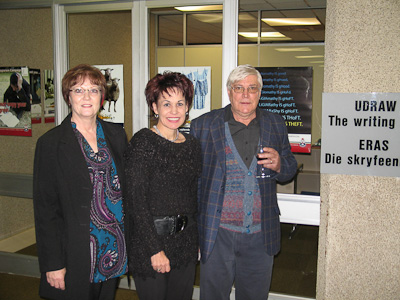Latest News Archive
Please select Category, Year, and then Month to display items
02 January 2025
|
Story Gerda-Marie van Rooyen
|
Photo Supplied
 Leading the research in South Africa is Prof Linus Franke from the Department of Soil, Crop and Climate Sciences.
Leading the research in South Africa is Prof Linus Franke from the Department of Soil, Crop and Climate Sciences.
Scientists are actively pursuing the successful breeding of diploid hybrid potatoes from inbred lines. This is expected to revolutionise potato breeding as it holds the key to rapid genetic progress. It will introduce new varieties for commercialisation through seed. Currently, existing potato variants have a gene that renders self-pollinated seeds infertile.
Prof Linus Franke, an academic in the Department of Soil, Crop and Climate Sciences at the UFS, is leading the research in South Africa. “This technology allows the production of genetically uniform potato seed that is easy to transport and largely disease-free.” He says this differs from conventional breeding whereby only vegetative propagation is possible due to tetraploid varieties in potatoes. It also risks carrying pests and diseases from one generation to the next – leading to the accumulation of pests and diseases with each round of multiplication.
Seed innovation
Prof Franke explains that Solynta BV, a seed company based in the Netherlands that produces potato varieties that can be grown from seed, has included South Africa in their research efforts because it is one of Africa’s largest producers and exporters. Through his academic relationship with Wageningen University and Research, a Dutch institution renowned for its agricultural endeavours and food production, the UFS became involved in researching hybrid potatoes grown from seed.
Diploid seeds containing two sets of chromosomes allow easier gene manipulation to increase predictability and speedier genetic progress. The breeding approach enables the incorporation of tolerance to pests, diseases, abiotic stresses (cold, heat, drought) and other desired genetic traits.
Although Prof Franke is optimistic about this research, he is not blind to disadvantages. “Potato seeds are tiny and have little energy reserves, making it harder to grow potatoes from seed than from tubers.” He says potatoes from seed will take longer to cultivate than tubers, as farmers need to grow plantlets from seeds first, adding six weeks to the growing period. “It is possible that commercial farmers can grow potatoes directly from seed. Alternatively, perhaps more likely, specialised growers will produce tubers of potatoes from seed; these tubers are then sold as seed tubers to other potato farmers, who then continue their normal practices of producing potatoes for the market from tubers.”
Financial benefits
Prof Franke says farmers have reason to get excited. “Seed potatoes will reduce input costs, as varieties with enhanced tolerance to pests and diseases require less pesticides. Planting one hectare of potatoes requires three to four tonnes of potato tubers, but only one 25 g packet of potato seeds.” Since potatoes are a more valuable commodity than maize, this technology might also increase farmers’ income potential.
UFS opens new Research and UDRAW writing unit
2010-08-27
 |
Ms Huibré Lombard, Prof. Driekie Hay and Prof. Louis Venter in front of the newly opened UDRAW facility in the UFS Sasol Library.
Photo: Christiaan van der Merwe |
The Library and Information Services Division at the University of the Free State (UFS) recently opened two brand-new facilities in the UFS Sasol Library, which includes a new research unit for postgraduate students as well as a new UDRAW Unit (Unit for the Development of Rhetorical and Academic Writing).
The opening of both units is the culmination of planning that originally started with Ms Huibré Lombard, Acting Director of the division Library and Information Services at the UFS, and Prof. Louis Venter, Head of UDRAW, back in 2005. The facilities were officially opened by the Vice-Rector: Teaching and Learning, Prof. Driekie Hay.
The research centre caters for postgraduate students, specifically for those studying towards a Masters or Doctoral degree at the UFS. The centre will help students by supplying advanced research information and specialised staff to cater for their needs. It will also serve as a quiet environment where students can come and work. The UDRAW facility will help shape the writing of postgraduate students as well as supervisors and also provide classes and consultations to further develop the research language of the students. An added benefit for students is that both services are provided free of charge to registered senior postgraduate students at our university.